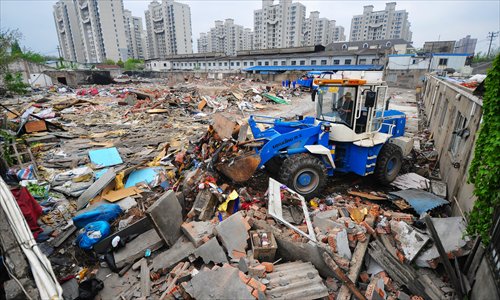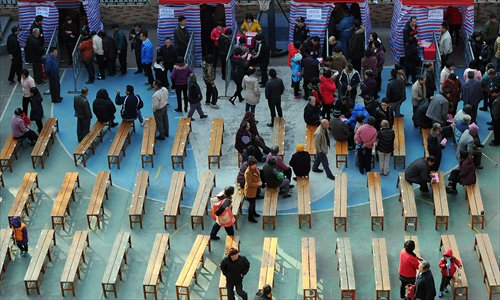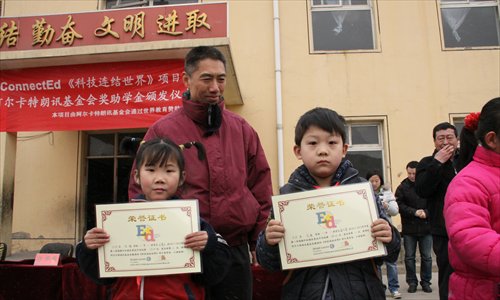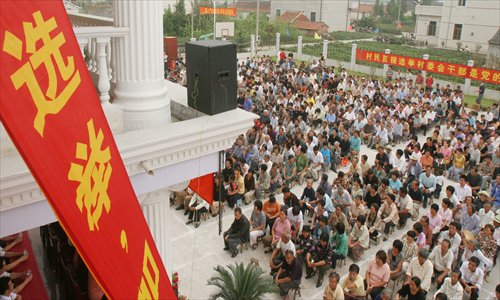Foreign-funded NGOs probed amid Trojan Horse worries

In front of newly completed buildings lie ruins of urban villages in Shanghai. Photo: CFP

Village elections, which are often observed by foreign NGOs. Photo: CFP

Children of migrant workers at a school in Daxing district, Beijing, receive a scholarship awarded by a French foundation and a US NGO on March 2, 2012. Photo: CFP

Village elections, which are often observed by foreign NGOs. Photo: CFP
Regulatory environment in recent months has become more difficult for NGOs that receive funding from overseas.
Several NGOs reached by the Global Times have confirmed that in recent months they received thorough probes by security authorities due to their involvement with overseas sponsors or partners.
"Similar probes have been conducted before. But this time they were more strict and careful. We were ordered to clarify detailed information in various tables concerning sources of funds, managers, activities and so on," said a general coordinator of an HIV/AIDS organization on condition of anonymity.
Another two NGOs, one based in Jiangsu Province and the other in Sichuan Province, also confirmed this. Another four NGOs, which have in the past received grants from overseas, either refused to comment or denied being investigated.
On June 17, a notice released on a government website of Yuncheng city, Shanxi Province, said that "according to requirements outlined by the National Security Commission of the CPC, a nationwide probe into overseas NGOs and their activities will be carried out between May and the end of July, to prepare for the strengthening of regulations in the future."
The National Security Commission, established on the basis of a decision made at the Third Plenary Session of the 18th CPC Central Committee last November, is a group designed to coordinate responses to unexpected security risks.
Though the notice was soon deleted from the website, it sparked nationwide speculation over the reportedly stricter stance toward non-governmental foreign engagement in China.
The move came as governments in Fujian, Anhui, Guangxi, Shandong and Guangdong also issued notices in April and June announcing they would launch investigations into overseas-related NGOs.
Accusations of infiltration
Maoist website Utopia recently released a special feature titled "NGOs infiltrating China." The collection of 27 reports called for China to "guard against malicious Westerners who seek to split China with the help of local funding recipients."
"In today's China, US proxy forces nurtured by NGOs are already powerful, spread out among government organs, academies and higher learning institutes," the website said in the editor's note. "The forces have already misled Chinese economic policy-making, causing huge losses and posing substantial political risks," the note added.
Such accusations are not isolated. A number of people have expressed doubts about some foreign NGOs' commitment to China, alleging that they financially support and nurture "neoliberal," "Western" and "anti-communist" forces.
As early as in October last year, a documentary, Silent Contest, allegedly produced by the Chinese PLA National Defense University, explicitly pointed out that some foreign NGOs flocked to China to target promising young politicians and intellectuals and draw them over to its side, citing the Ford Foundation, the China International Republican Institute, the Carter Center and the Asia Foundation.
"These accusations are exaggerated if not groundless," responded Yawei Liu, director of the Carter Center's China Program.
"China is a major power that is confident of its development path, governing system and ruling theory. It is hard to believe the so-called foreign research funding or grants can weaken an entity that is supported by the majority of the people," Liu told the Global Times.
In 2012, the Carter Center invited Chinese officials and scholars to observe the US presidential elections for the sixth time. Some Chinese claimed that these activities were designed to incite pro-democratic sentiments to challenge the government back home.
But Liu stated the center organized observation missions at the request of the Chinese Ministry of Civil Affairs. Since 1998, at the invitation of the ministry, the center has organized Americans to observe village elections in China, according to Liu.
"We were told this was learning from each other. No country's political system is universally applicable to other nations," he said. "Scholars have repeatedly told us that observing elections in the US has convinced them the American electoral system is broken, has to be fixed and can never be applied to China."
Liu said that the Carter Center has no office in China as requirements for international NGOs to register in China are hard to meet.
While the Ford Foundation, a US organization which set up a Beijing office in 1988, said it hasn't faced any new barriers impeding its activities in China.
"We have not faced challenges related to our operations. We understand and abide by the laws and regulations of China and have encouraged developments over the years to establish a transparent and reliable regulatory system," Joshua Cinelli, the manager of the foundation's Strategic Communications and Media Relations, told the Global Times in an e-mail.
Over the past 30-some years, the foundation has focused on "helping Chinese society adapt to the challenges of balancing economic expansion and equity" and handed out grants totaling more than $275 million in China.
Its grantees include the Chinese Academy of Social Sciences (CASS), the Beijing Civil Society Development Research Center, China Arms Control and Disarmament Association, Tsinghua University and Zhejiang University.
The Ford Foundation will continue its efforts in China, said Cinelli.
Politics and NGOs
There are 4,000 to 6,000 overseas NGOs that have programs on the mainland, including around 1,000 which have long-term programs, according to Chinese Social Sciences Today, a newspaper sponsored by CASS.
Most foreign NGOs are well-intentioned and have brought in funds, technology and management experience beneficial for the country's advancement in many fields.
"But hundreds of them have a background of political penetration," Wang Cunkui, professor with People's Public Security University of China, said in an interview with the newspaper in May.
"The existing investigations show that a few are conducting illegal activities in China. For example, some NGOs, which played key role in drastic changes in Eastern Europe, have entered in China to make ideological infiltration through means like cultural exchanges, education donations and training," Wang noted.
They collect intelligence, make noises, provoke chaos and hostility under the name of assisting the disadvantaged such as unemployed workers, displaced farmers and retired soldiers, as well as supporting street demonstrations and separatist activities, he added.
The anonymous HIV/AIDS NGO coordinator said he felt that the young radicals, backed by foreign sponsors, sometimes went to extremes in the name of pursuing justice.
"Some crackdowns are necessary as we can't treat the issue lightly under the present political situation," he told the Global Times, citing political turmoil in the Middle East and North Africa.
Some CASS researchers recently revealed on Weibo that an investigation had been carried out within the academy, targeting those who have close contacts with NGOs and foundations, days after its discipline chief Zhang Yingwei criticized some staff for "receiving point-to-point infiltration from overseas forces."
Such concerns are precedented. In 2005, Lu Jianhua, a public policy researcher, and Chen Hui, the assistant of the academy's office director, were arrested and sentenced for "leaking State secrets." In 2009, another two CASS researchers were reportedly arrested for similar charges.
Some scholars also said recent moves in Russia offer lessons for China.
Moscow has tightened controls over NGOs in recent years. In 2012 Moscow endorsed a new law requiring all NGOs to register as "foreign agents" if they receive any financing from abroad.
Nevertheless, Ding Dong, a political commentator, said China should not panic and overreact.
"It's inappropriate to overstate the negative impacts of NGOs and restrict their development. We should see things in an open-minded and comprehensive way," Ding, who was invited to observe the US elections in 2012, told the Global Times. "Otherwise, a hostile atmosphere will be promoted and shadow the development of NGOs."
Foreign influences
Some charity workers said the series of actions and statements hinted that Beijing is discouraging Chinese NGOs and scholars from working with foreign partners or supporters. There have also been concerns that the tightened control over NGOs will scare away foreign aid as many NGOs in China have received grants from overseas.
However, the anonymous HIV/AIDS NGO coordinator said the impact would be smaller for NGOs like his than for colleges and research institutes, which are of a more political nature.
According to a 2012 report on US NGOs in China released by the China Charity Information Centre run by the Ministry of Civil Affairs, 82 percent of the funds from the US went to higher education institutes, research institutes and government agencies, and only 17 percent went to grass-roots non-profit organizations.
The report also showed that China had around 1,000 American NGOs, but less than 3 percent of them had a legal identity in the country.
Some domestic NGOs have actively cut contact with foreign foundations. In May last year, the Beijing Aizhixing Institute, an HIV/AIDS NGO, openly issued a letter, saying it would no longer receive funds from the US National Endowment for Democracy, which had also "given funds to East Turkestan terrorists."
Yu Fangqiang, the executive director of the Nanjing-based NGO Justice for All, said many NGOs look toward foreign organizations for funding as it is difficult to raise funds on the Chinese mainland.
"People here have yet to form a habit of giving donations like in Hong Kong, as well as Western countries. In addition, most NGOs haven't officially registered, which hinders them in terms of raising funds from companies, because the companies can't apply for tax exemptions," Yu told the Global Times.
Taking State security into consideration, it's reasonable for the country to monitor the inflow of the charity funds from overseas, said Yu.
"But I think it works much better to supervise how the funds are used rather than the origins of the funds. It would be fine as long as the activities are within the framework of Chinese laws and regulations," he suggested.
Ding said Chinese NGOs need to be developed rather than restricted.
"China needs to hear voices from the bottom, and government power needs a balance from civil society. The NGOs are an good alternative force to supervise power," Ding said.
Yu said Chinese NGOs are still mainly engaged in charity causes and most don't have any influence in terms of policy development.
The scrutiny over NGOs comes amid a campaign focused on ideology. The Organization Department of the CPC Central Committee issued a circular last week, demanding that officials enhance "character education" and reaffirm their faith in socialism and communism, as well as seek independent thinking and avoid to becoming "yes-men" for Western moral values.
Chinese must be cautious but sober. And we will recognize the "angels" that help with the country's public welfare undertakings and spare no tolerance for those "demons' with destructive intentions which threaten security and stability, Wang noted.
Zhang Qi contributed to this story
Newspaper headline: Funds under suspicion